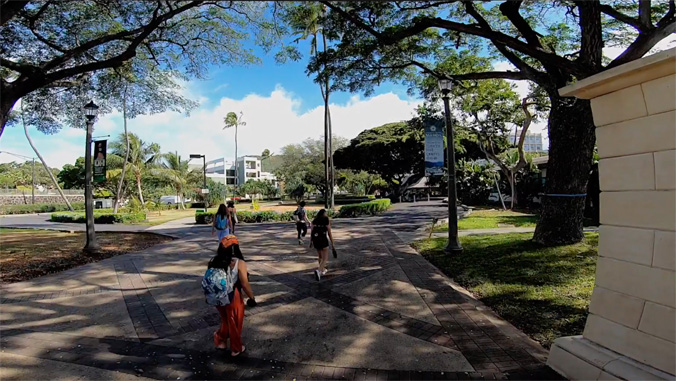
In an effort to better prepare University of Hawaiʻi at Mānoa students to make responsible alcohol usage choices, the Division of Student Success has introduced the campus to AlcoholEdu, a national online program designed to educate college students about alcohol use, misuse and potential consequences.
AlcoholEdu features interactive modules featuring videos, quizzes and scenarios that cover topics related to alcohol and other drug consumption. The content is personalized for students at UH Mānoa.

“These initiatives promote the health and safety of students by equipping them with knowledge about the potential physical and mental health consequences of substance misuse, as well as strategies for responsible decision-making,” said Alcohol and Other Drug Counselor Kuʻulei Salzer, from the University Health Services Mānoa, Health Promotion. “Moreover, education and ongoing support programs help students maintain their academic performance by mitigating the negative impact of substance misuse on concentration, memory and overall well-being.”
UH Mānoa students are strongly encouraged to complete AlcoholEdu online.
Fostering alcohol-healthy student relationships
In addition to AlcoholEdu, students are also encouraged to attend BASICS (Brief Alcohol Screening and Intervention for College Students), a program that provides them with personalized feedback on their alcohol use patterns and associated risks.
Through BASICS, students are educated on responsible drinking practices, coping mechanisms for managing stress and peer pressure, and goal-setting techniques, empowering students to develop healthier relationships with alcohol and navigate social situations more safely.
Students who feel they need additional support for their alcohol or other drug use can complete the BASICS Assessment Form to schedule a session with Salzer. More information can be found at the University Health Services website.
Perceptions of alcohol consumption
To determine student perceptions of alcohol usage, Health Promotion conducted a Mānoa Alcohol Project Survey, finding that 15% of students believe that their peers drink every day—in reality, the amount total is less than 1% of students drinking daily.
“This misperception could lead other students to believe that heavy drinking is a normal part of the college experience, when in reality, the majority of students are making low-risk choices when it comes to alcohol,” said Salzer. “By educating young adults about alcohol and drug use, we can bring more clarity and reinforce the actual substance use norms at UH Mānoa.”
Safe space to seek help
At UH Mānoa, a Good Samaritan Policy is implemented with the primary goal of encouraging students to seek help in alcohol-related emergencies.
“We aim to create a safe space for students to ask for help, and under this policy, if they seek medical assistance for themselves or others, they are granted certain protections from disciplinary action related to underage drinking,” explained Theresa Crichfield, associate vice provost for student success and UH Mānoa dean of students. “This is something we applied informally in the past, and when the Good Samaritan Policy was passed in 2015, we officially formalized this practice at UH Mānoa.”
By addressing substance abuse proactively, students are supported in their personal development, and empowered to navigate social pressures effectively, boosting their overall success and well-being.
For any questions or concerns, students can email alcohol@hawaii.edu, or visit the University Health Services website for more information.

